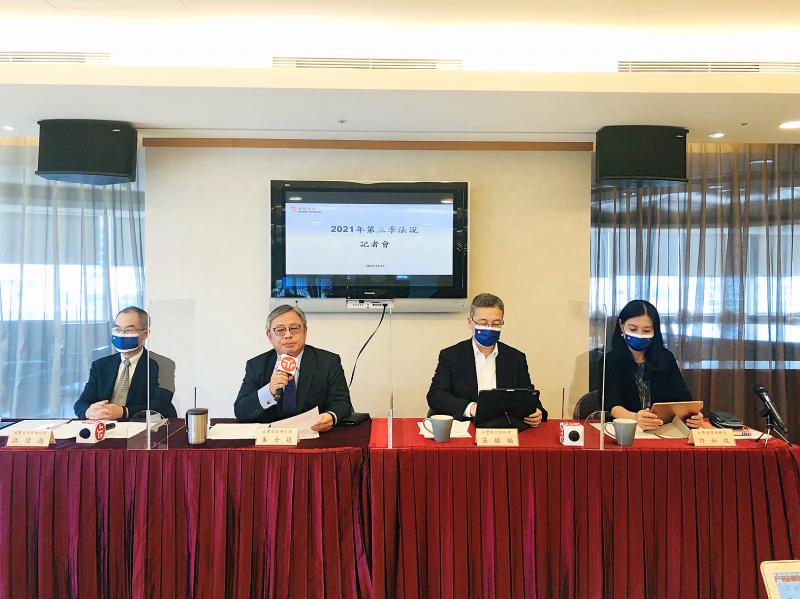An interest rate hike by the US Federal Reserve would have a mixed impact on SinoPac Financial Holdings Co (永豐金控), as such a move would likely benefit its banking arm, but be a drag on its securities arm, company officials told an investors’ conference in Taipei yesterday.
SinoPac Securities Co (永豐金證券) president Jerry Chiang (江偉源) said that by rule of thumb, the local stock market would not necessarily plunge immediately after a Fed rate hike, but it would not boom, either.
The securities unit forecast daily average turnover at the local stock market would fall to between NT$300 billion and NT$400 billion (US$10.79 billion and US$14.38 billion), compared with a peak of NT$600 billion to NT$700 billion this year, Chiang said.

Photo: Kelson Wang, Taipei Times
However, he said that he has a conservative outlook for the unit’s net fee income growth next year.
SinoPac Securities garnered net fee income of NT$2.46 billion last quarter, up 22 percent from a year earlier, while its cumulative net fee income for the first three quarters advanced 43 percent to NT$7.3 billion thanks to abundant transactions of local stocks.
If turnover in the local stock market slides next year as expected, SinoPac Securities could help clients conduct more transactions in foreign stocks to offset the effects of a rate change in the US, SinoPac Financial president Stanley Chu (朱士廷) told the conference.
“Market consensus is that the Fed will raise interest rates next year, but with people debating when the first rate hike would occur, the global market would be more volatile next year,” Chu said.
Bank SinoPac (永豐銀行) nonetheless holds a positive outlook for next year’s net interest margin (NIM), a gauge of a bank’s profitability, and expects room for further growth after a rate hike, Bank SinoPac president Eric Chuang (莊銘福) said.
NIM last quarter grew by 2 basis points from a quarter earlier to 1.06 percent, the fastest rate in the past 12 months, as the bank’s demand deposits rose relative to overall deposits, reducing costs paid to depositors, Chuang said.
The ratio of demand deposits to total deposits edged up 1.4 percentage points quarterly to 55.5 percent last quarter, as some clients canceled fixed deposits to put money into stocks and other investment targets while the bank collaborated with companies to provide salary accounts for their employees, he said.
Bank SinoPac’s net fee income from credit card business decreased 80 percent annually to NT$18 million last quarter as credit card spending continued to shrink due to a lack of overseas consumption amid tight border controls, he said.
The number of credit card transactions has rebounded, but the amount per transaction remains low, he said.
Taiwan’s central bank is also expected to raise interest rates next year, given strong inflationary pressure, but it would likely keep them unchanged until the Fed acts, SinoPac Financial lead economist Jack Huang (黃蔭基) said.
The first rate hike by Taiwan is likely to occur in the fourth quarter next year at the earliest, Huang said.

MULTIFACETED: A task force has analyzed possible scenarios and created responses to assist domestic industries in dealing with US tariffs, the economics minister said The Executive Yuan is tomorrow to announce countermeasures to US President Donald Trump’s planned reciprocal tariffs, although the details of the plan would not be made public until Monday next week, Minister of Economic Affairs J.W. Kuo (郭智輝) said yesterday. The Cabinet established an economic and trade task force in November last year to deal with US trade and tariff related issues, Kuo told reporters outside the legislature in Taipei. The task force has been analyzing and evaluating all kinds of scenarios to identify suitable responses and determine how best to assist domestic industries in managing the effects of Trump’s tariffs, he

TIGHT-LIPPED: UMC said it had no merger plans at the moment, after Nikkei Asia reported that the firm and GlobalFoundries were considering restarting merger talks United Microelectronics Corp (UMC, 聯電), the world’s No. 4 contract chipmaker, yesterday launched a new US$5 billion 12-inch chip factory in Singapore as part of its latest effort to diversify its manufacturing footprint amid growing geopolitical risks. The new factory, adjacent to UMC’s existing Singapore fab in the Pasir Res Wafer Fab Park, is scheduled to enter volume production next year, utilizing mature 22-nanometer and 28-nanometer process technologies, UMC said in a statement. The company plans to invest US$5 billion during the first phase of the new fab, which would have an installed capacity of 30,000 12-inch wafers per month, it said. The

Taiwan’s official purchasing managers’ index (PMI) last month rose 0.2 percentage points to 54.2, in a second consecutive month of expansion, thanks to front-loading demand intended to avoid potential US tariff hikes, the Chung-Hua Institution for Economic Research (CIER, 中華經濟研究院) said yesterday. While short-term demand appeared robust, uncertainties rose due to US President Donald Trump’s unpredictable trade policy, CIER president Lien Hsien-ming (連賢明) told a news conference in Taipei. Taiwan’s economy this year would be characterized by high-level fluctuations and the volatility would be wilder than most expect, Lien said Demand for electronics, particularly semiconductors, continues to benefit from US technology giants’ effort

‘SWASTICAR’: Tesla CEO Elon Musk’s close association with Donald Trump has prompted opponents to brand him a ‘Nazi’ and resulted in a dramatic drop in sales Demonstrators descended on Tesla Inc dealerships across the US, and in Europe and Canada on Saturday to protest company chief Elon Musk, who has amassed extraordinary power as a top adviser to US President Donald Trump. Waving signs with messages such as “Musk is stealing our money” and “Reclaim our country,” the protests largely took place peacefully following fiery episodes of vandalism on Tesla vehicles, dealerships and other facilities in recent weeks that US officials have denounced as terrorism. Hundreds rallied on Saturday outside the Tesla dealership in Manhattan. Some blasted Musk, the world’s richest man, while others demanded the shuttering of his